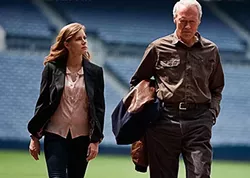Trouble With the Curve
No curveballs — Eastwood stars in ballpark vehicle that covers its bases

Audio By Carbonatix
[
{
"name": "GPT - Leaderboard - Inline - Content",
"component": "35519556",
"insertPoint": "5th",
"startingPoint": "3",
"requiredCountToDisplay": "3",
"maxInsertions": 100,
"adList": [
{
"adPreset": "LeaderboardInline"
}
]
}
]

Trouble With the Curve| C
Old soldiers never die, they just soldier on, and in the case of Clint Eastwood they keep cranking out films well into their twilight years. The prodigious Eastwood has been making movies about washed-up coots grappling with their diminished potency since he was still relatively young and vital, and his last onscreen turn, in 2008's Gran Torino, was presumed to be his swan song to acting. Yet, here he is, back on screen, directed by his longtime producing partner turned newbie director Robert Lorenz, and playing yet another grizzled grump who must open his heart to change, even as the performer has become calcified in his mannerisms. The only snag is that if the former Dirty Harry keeps trying to prove his relevance, he might need to dig deeper than crowd-pleasing trifles like this one.
This time Clint turns to the shopworn metaphors of the baseball diamond, playing a crotchety major league scout determined to show those number-crunching, computer-using Moneyball whippersnappers a thing or two. He's got an old man's name (Gus), an old man's shambling gait, and the same Tupperware he's had since the Nixon administration. Widower Gus is fixed in his ways — but those ways have served him for decades as an expert scout for the Atlanta Braves, and the only thing slowing him down now is the slowly spreading glaucoma that's making it harder and harder for him to see the pitches anymore.
Ownership is looking for an excuse to put the grouchy cuss out to pasture, but the sympathetic director of scouting (John Goodman) wants to give Gus one more shot in the name of loyalty, and so he dispatches the veteran to a North Carolina backwater to check out a heavily hyped slugger. Gus' estranged, adult daughter, Mickey (Amy Adams), is recruited to serve as his eyes — and conscience — and she agrees to take a brief respite from climbing the ladder as her high-stress law firm, presumably because her love life is in the dumps and she has unresolved daddy issues, not the least of which is that she was named after a Yankee legend. Mickey keeps pressing her reluctant pops to revisit their tortured family history, but gets mostly grunts in return. She's making little headway on that front, but luckily she's got an obvious romantic foil in the form of Justin Timberlake's Johnny, a burnt-out former pitching stud now scouting for the Red Sox while dreaming of a job in the announcer's booth. If you're surprised when the uptight lawyer and the cocky hotshot start going clog dancing, skinny-dipping and making googly-eyes at each other, then we can presume that you've never seen a movie before.
Just as the wizened Gus can tell if a prospect has a flaw in his swing just by the crack of his bat, experienced moviegoers will be able to spot the predictable plot points coming down the pipe. It's likely Eastwood prefers it that way; he choose Randy Brown's clichéd script as surely as a retiree orders the same comforting slab of meatloaf he's had ten thousand times before.
A one-time politician, Clint knows how to work a crowd, and he surrounds himself with an able cast, led by the sprightly and smart Adams, counterbalancing the crusty strangeness of his own performance. Eastwood's irascible, throaty growl, which sounds like a thousand rusty screen door hinges opening at once, is so intense it takes a few minutes to settle in to the idea that he's not kidding around with it. This is how Clint speaks, and always has, though he's aware enough of the absurdity to play his gruffness for laughs. After 50-odd years in showbiz, and dozens of turns behind the camera, there isn't much that Clint Eastwood doesn't know about his own skills or about filmmaking, and if he wants to indulge in maudlin, cornball sentimentalism now and then, it's his prerogative — and it's our prerogative as viewers to wait for a better pitch.





